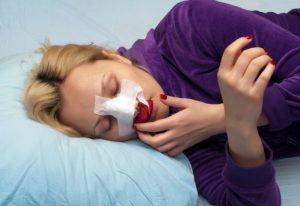 Relapsing polychondritis is an autoimmune disorder that presents with non-specific symptoms affecting the neck, nose, throat, and ears. The disease is rare and primarily involves cartilage tissue becoming inflamed.
Relapsing polychondritis is an autoimmune disorder that presents with non-specific symptoms affecting the neck, nose, throat, and ears. The disease is rare and primarily involves cartilage tissue becoming inflamed.
Any tissue that contains cartilage is at risk of being affected by this condition. The eyes, blood vessels, and heart have cartilage in them, making them potential sites for inflammation.
Advertisement
Twenty-five to thirty-five percent of people suffering from relapsing polychondritis also suffer from other autoimmune disorders.
Prevalence of relapsing polychondritis
While considered a rare disease, cases of relapsing polychondritis have been estimated as being 0.71, 2.0, and 3.5 cases per million in the United Kingdom, Hungary, and Minnesota, respectively. The condition appears to affect all races and ages groups, with no discrimination between gender as well. Relapsing polychondritis is not passed down in families but has been identified as having some genetic susceptibility.
Those affected by the condition are expected to have a 5-year survival rate of 66-77 percent, and a 10-year survival rate of 55 percent. However, these statistics were found in patients with less severe disease. The overall life expectancy in all patients is expected to less when compared with healthy individuals of the same age and gender.
What causes relapsing polychondritis?
No one knows why relapsing polychondritis occurs, but it is suspected to have an autoimmune association. This means that the body’s own immune cells, normally responsible for fighting off foreign invaders, attack the body itself. The condition may also be linked to certain gene mutations, however, relapsing polychondritis doesn’t seem to run in families.
Complications may arise as this condition leads cartilage to collapse. This can lead to a disfigured face and an obstructed airway. It also affects the eyes and ears, leading to their disfigurement as well.
What are the symptoms of relapsing polychondritis?
Because collagen is present throughout the body, the symptoms of relapsing polychondritis may present in several different ways. These include:
- Weight loss
- External ear pain
- Dizziness, vertigo, tinnitus (ringing in the ears)
- Ataxia of vestibular origin (loss of balance)
- Hearing impairment—46 percent of patients in later stages suffer from hearing problems
- Arthralgia (joint pain)—50 to 85 percent of cases affect the synovial joints
- Chondritis (inflammation of cartilage)
- Nose pain
- Hoarse voice and difficulty speaking
- Laryngeal, glottis, and subglottic inflammation
- Oedema (fluid buildup)
- A cough, choking, and wheezing
- Costochondritis (pain in chest)
- Recurrent episcleritis and scleritis (inflammatory conditions of the eye)
- Myocarditis, pericarditis, aneurysm, and myocardial infarction
- Glomerulonephritis (kidney pathology)
- Cranial lesions
Diagnosing polychondritis
After being seen by a doctor, a full history will be taken to assess all the different aspects of the condition as possible. In order to make a diagnosis of polychondritis more standardized, criteria for diagnosis has been developed. This means that a person must present with a particular set of symptoms for the diagnostic inquiry to proceed. The criteria for polychondritis includes at least three of the following:
- Inflammation of the cartilage in both ears (excluding the soft lower earlobe)
- Arthritis of multiple joints (despite X-rays not showing joint damage)
- Inflammation of the cartilage over the bridge of the nose
- Eye inflammation
- Inflammation of the cartilage of the trachea or throat
- Neurosensory hearing loss, ringing in the ears (tinnitus) and/or a sensation of spinning (vertigo)
Once a suspecting diagnosis of polychondritis is made, additional testing can be done to help provide some evidence in this regard. This will come in the form of a biopsy that can be examined under a microscope. A biopsy can help rule out other causes of the presenting symptoms and can confirm polychondritis.
Treating relapsing polychondritis
Unfortunately, there is no cure for relapsing polychondritis. Therefore, the main mode of treatment is to relieve symptoms by decreasing the amount of inflammation. The use of over counter anti-inflammatory medications, such as Motrin or Advil, can help manage pain.
If symptoms are troubling, your doctor may suggest using steroid medication. This can help with moderate cases of inflammation. In more severe cases of inflammation, the use of drugs that inhibit the immune system may be utilized.
Relapsing polychondritis diet
It is possible to employ various nutritional strategies to help with symptoms of relapsing polychondritis. A diet called the McDougall program is recommended by many as it is practical. This diet is basically a low-fat vegan diet.
Advertisement
This means no dairy or eggs and the elimination of all meats.
Relapsing polychondritis prognosis
Having repeated bouts of inflammation in many areas of the body can lead to permanent destruction of the involved tissue. Depending on the extent of damage, this may or may not lead to disability. Relapsing polychondritis follows a degenerating and remitting course making a definitive prognosis high dependent on the bodily symptoms involved. If the condition is recognized early with the delivery of optimal therapy as soon as possible, improvements to prognosis are likely.
Related: Ear cartilage pain (auricular chondritis): Causes, treatment, and relief tips
